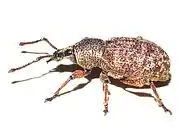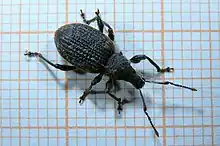Otiorhynchus
Otiorhynchus (sometimes misspelled as Otiorrhynchus) is a large genus of weevils in the family Curculionidae. Many species of the genus, particularly the black vine weevil (O. sulcatus) and the strawberry root weevil (O. ovatus), are important pests, both as larvae and as adults. Larvae feed on plant roots. Adults are flightless with fused elytra and feed at night on plant foliage.[2][3] In many species of the genus at least some races are polyploid and parthenogenetic, while the rest of the races and species are diploid and bisexual. Otiorhynchus weevils, particularly O. scaber, have been a popular subject for studies of the evolution of parthenogenesis. The genus is native to the Palearctic region. However, sixteen species were inadvertently introduced to North America and have become widespread there.[2][3]

| Otiorhynchus | |
|---|---|
 | |
| Otiorhynchus sulcatus | |
| Scientific classification | |
| Domain: | Eukaryota |
| Kingdom: | Animalia |
| Phylum: | Arthropoda |
| Class: | Insecta |
| Order: | Coleoptera |
| Infraorder: | Cucujiformia |
| Family: | Curculionidae |
| Tribe: | Otiorhynchini |
| Genus: | Otiorhynchus Germar, 1824 |
| Species | |
|
1500+ | |
| Synonyms | |
| |
A number of species are troglobites, cave-dwelling animals that lack eyes.[4][5]
There are over 1,500 species in this genus, which is divided into at least 105 subgenera.[4]
Species include:
- Otiorhynchus alpicola
- Otiorhynchus arcticus
- Otiorhynchus cribricollis
- Otiorhynchus cuneiformis
- Otiorhynchus dieckmanni
- Otiorhynchus frater
- Otiorhynchus gemmatus
- Otiorhynchus grischunensis[6]
- Otiorhynchus ligneus
- Otiorhynchus ligustici
- Otiorhynchus magnanoi[7]
- Otiorhynchus meridionalis
- Otiorhynchus morio
- Otiorhynchus ovatus
- Otiorhynchus porcatus
- Otiorhynchus rhacusensis
- Otiorhynchus radjai[5]
- Otiorhynchus raucus
- Otiorhynchus rugifrons
- Otiorhynchus rugostriatus
- Otiorhynchus scaber
- Otiorhynchus sensitivus
- Otiorhynchus singularis
- Otiorhynchus sulcatus
- Otiorhynchus vehemens
References
- A 1972 ruling by the ICZN suppressed the names Brachyrhinus, Loborhynchus, Mecocerus, and Panaphilis, and conserved the name Otiorhynchus, attributing it to Germar, 1824 (not 1822).
- Warner, R. E. & F. B. Negley. 1976. The genus Otiorhynchus in America north of Mexico (Coleoptera: Curculionidae). Proceedings of the Entomological Society of Washington 78 (3): 240-262.
- Bright, D. E. & P. Bouchard. The Insects and Arachnids of Canada, Part 25: Coleoptera. Curculionidae. Entiminae. Weevils of Canada and Alaska. Vol. 2. Ottawa, NRC Research Press, 2008. ISBN 0-660-19400-7. P. 111-131.
- Hlavač, P. (2011). Endogean and cavernicolous Coleoptera of the Balkans. XI. Revision of the subgenus Troglorhynchus Reitter of the genus Otiorhynchus Germar (Coleoptera: Curculionidae). Archived 2015-02-22 at the Wayback Machine Natura Croatica 20(1), 189-200.
- di Marco, C. and G. Osella. (2002). Otiorhynchus radjai sp. n. from Vis Island (Dalmatia, Croatia), and description of a new subgenus of Otiorhynchus Germar (Coleoptera, Curculionidae). Italian Journal of Zoology 69(3), 257-62.
- Germann, C. (2010). Otiorhynchus (Nihus) grischunensis sp. n.—a new species of the O. rhilensis species group from the Swiss Alps (Curculionidae, Entiminae). Archived 2016-03-03 at the Wayback Machine Zootaxa 2368, 59-68.
- Keskin, B. (2007). A new species of the genus Otiorhynchus Germar, 1822 (Coleoptera: Curculionidae: Entiminae) from Western Anatolia (Turkey). Zootaxa 1588, 63-68.
Further reading
- O'Brian, K. A touch of weevil. The Daily Telegraph 12 October 2002.